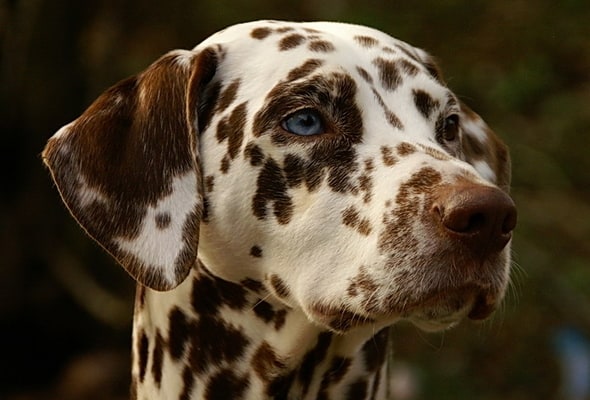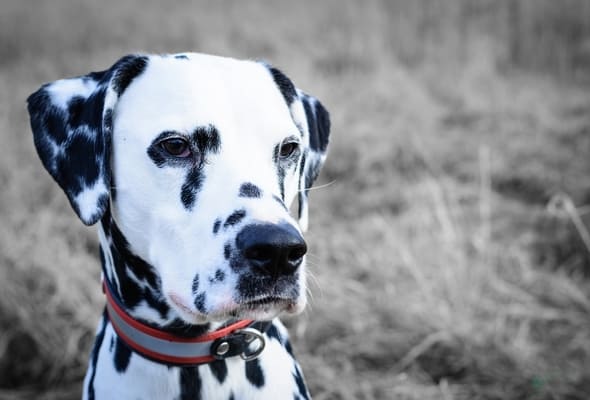The Dalmatian is one of the most distinctive dog breeds in existence. Their trademark coat has led to their immortalization in popular culture, from the 1956 novel The Hundred and One Dalmatians to the subsequent Disney films. Many prospective owners have wondered, are dalmatians good dogs?
Are Dalmatians Good Dogs?
Yes, Dalmatians are very good dogs. In addition to their physical beauty, they are intelligent, playful, and make wonderful pets.
Beneath the quirky spotted coat is an elegant, athletic trotting dog. Dalmatians typically stand between 19 and 23 inches at the shoulder and possess powerful hindquarters that evolved to help them traverse long distances.
Originally bred to guard horses and coaches, the Dalmatian breed has an innate protective instinct and loyalty to their ‘preferred humans’. They are outstanding watchdogs and are said to have unusually long memories, with the ability to recall mistreatment they have received for years.
The origins of the Dalmatian are shrouded in mystery. Researchers have espoused different theories of the Dalmatian breed emerging in the British Isles, Europe, North Africa, and Asia. By the early 1800s however, the breed was most populous among a portion of Central Europe by the Adriatic Sea, once known as Dalmatia.
With its inherent qualities developed during its beginnings as a coach dog, the Dalmatian breed has evolved as an all-rounder who excels in a variety of roles, including draft dog and shepherd, sporting dog, pack dog, and performer.
Are Dalmatians Good Beginner Pets?
Dalmatians are fiercely loyal and eager to please, making them excellent companions for the right person or family. However, experts have cautioned that the breed may be too energetic for very small children. For small children, a Dalmatian may not be a good choice for a first dog.

There is a dog breed for everybody, and it is worth researching a prospective pet thoroughly. Dalmatians require a copious amount of physical activity, so if you lead an active lifestyle and have a strong desire to include your pet in as many activities as possible, a Dalmatian can be a suitable first dog.
The enthusiasm and energy of Dalmatians make them a poor choice for an owner seeking a laid-back first dog. Dalmatian ownership is incredibly rewarding, but it requires dedication, patience, and commitment to keeping the Dalmatian engaged.
If left alone for too long or not given sufficient exercise, a Dalmatian will likely tear your house apart out of sheer boredom. The ideal Dalmatian owner does not live in an apartment or work in a situation that requires them to leave their dog at home alone for significant stretches of time.
The physical beauty of the Dalmatian breed may be a powerful lure for potential owners, but anyone considering ownership must give serious thought to whether they can commit to the lifestyle required.
What Is the Temperament of a Dalmatian?
The temperament of the Dalmatian breed varies. Despite their adorable, Disney-fied image, Dalmatians can be aggressive under certain circumstances. Dalmatians who become aggressive are usually so because of poor breeding, lack of attention, and not getting enough exercise.

As we’ve previously covered, Dalmatians require abundant exercise and hours of engagement, play and interaction in order to be happy. A neglected, bored and cooped-up Dalmatian is considerably more likely to display aggressive tendencies towards other dogs and humans alike.
Dalmatians have a natural tendency toward being quick to anger. As previously stated, they have long memories and may hold on to perceived slights. A responsible Dalmatian owner, and anyone who interacts with dogs in general, should always be alert for the signs that a dog may be about to commit an act of aggression.
This is particularly important, as many people may not understand or comprehend that the adorable Dalmatian breed can actually be capable of harm. Signs include baring teeth, low growls, snarling, an unusually rigid posture, an erect tail that isn’t wagging, and deep, loud bark.
On the other hand, a well-cared-for Dalmatian is dependable, dignified in bearing, and high-spirited.
How Do You Keep a Dalmatian Happy?
Exercise and companionship are key to ensuring a healthy and happy Dalmatian. A conscientious owner will engage their pet with a generous amount of physical activity. A Dalmatian is a tireless and enthusiastic partner when it comes to hiking, jogging, and playing outdoors in general.
More structured activities such as obedience and agility courses are also highly recommended.
If you happen to be a horse owner, even better! The Dalmatian breed has a particular affinity for horses, and horses love them right back. Dalmatians were originally bred to run alongside horses as they pulled English stagecoaches, and to guard them against potential thieves at night.
Suffice to say, the connection between these animals runs deep. It is often said that the mere presence of an equine friend has a calming effect on a Dalmatian.
Are Dalmatians Expensive?
As the demand for Dalmatians is relatively low, they are not a particularly expensive breed. It is possible to purchase a Dalmatian from a high-quality breeder for around $500 to $1,200, much less than most other big dogs.
However, monthly expenses must be taken into account. The monthly cost of owning an adult Dalmatian is said to be around $135. A Dalmatian puppy is estimated to cost at least $300 a month.
It is rare to find Dalmatians up for adoption at local shelters, and the ones you find will likely be older and may have a history of abandonment, neglect, or abuse. Given that the breed is inherently quick to anger, it is wise to consider all possibilities before taking on a Dalmatian from a shelter.
Conclusion
In summary, Dalmatians are good dogs, but they are complex dogs. Bred for guarding, loyalty is in their blood. They are enthusiastic athletes who make playful and steadfast companions for owners who have the time and energy to manage their needs.
However, they are not suitable for everybody, and Dalmatians who do not have an outlet for their considerable energy have been known to become destructive towards property and aggressive towards other dogs and humans.
Anyone considering bringing a Dalmatian into their life must give serious thought to whether they can truly meet the challenge of caring for this beautiful, but often difficult and misunderstood breed.

